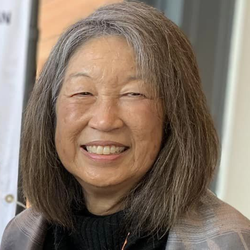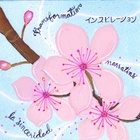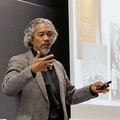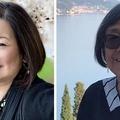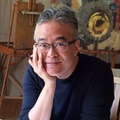This month, we feature the fierce and insightful voice of San Jose-based Susan Hayase. While I am most familiar with Susan in intergenerational community organizing and activist spaces, I am grateful always to read her writing, as she has so much to share and teach us. Here we present pieces of both query and homage, from three distinct grandparents of Susan’s to the singular Alan Nishio. Enjoy…
—traci kato-kiriyama
* * * * *
Susan Hayase was a part of the grassroots movement for Japanese American redress in San Jose, working in the Nihonmachi Outreach Committee (NOC) and the National Coalition for Redress/Reparations (NCRR.) A performing member of San Jose Taiko from 1980 through 1990, appointed in 1995 to the Civil Liberties Public Education Fund Board by President Clinton, serving as its vice-chair, most recently she is a co-founder of San Jose Nikkei Resisters (SJNR), a grassroots multi-generational community organization building support for reparations for slavery as well as for public safety and issues of accountability, and to organize around sustainability for San Jose Japantown.
When I was a kid, my father had sisters and parents but my mom only had a sister. Mom’s dad died when she was 5, her sister when she was 9 and her mother when she was 11. I was always worried that she was lonely. She seemed lonely to me.
The Three Grandparents, named
To the most mysterious grandparent, papa with the unusual name,
Tsuru, like crane, widest wingspan, longest range,
long lost man in a sepia-toned photo provided ONLY by my imagination
with vest and bowler
for no apparent reason, JUST sartorial fantasy
JUST historical distortion for a worker who followed the crops.
Photo? What photo? Had you never posed for a casual snapshot, papa?
Is that an imaginary moustache on your lip hiding your expression from me --
your distant grandchild -- now old myself?
My query is not a plea for your blessing
No, it’s a rebuke for having left my mother at five years of age with no memories of YOU.
A photo of a closed coffin adrift in flowers at the Buddhist temple in Santa Barbara
with grandmother, flanked by Yone, Taye, and Kiku.
The congregation in black, silent, standing up for you, papa Tsuru.
The priests in black, dutiful, standing up for grandmother, now alone with three daughters
Had you planned for that, papa Tsuru?
Insurance companies that would cover the Japanese were yet to be invented.
A policy?
Would a migrant laborer have one?
Buddhist priests in black, serving their sangha, acting in place of baishakunin
saving grandmother with a bachelor Issei husband who would support the girls,
Just in time
Had you planned for that, papa Tsuru? Did you know that would happen?
To my second-most mysterious grandparent, mama with the unusual name
Naka, like inside, like middle,
like squeezed by the necessity of marrying for the second time, maybe …
for the first time,
squeezed by immigration into leaving your daughter in Japan,
mama Naka -- squeezed in the middle, between a rock and a hard place
when he sent for you,
when you crossed the ocean,
when you left the girl,
did he know you were so old, a full twenty-eight years lost?
ten years older than a picture bride should be,
fewer years to follow the crops
fewer years to work the fields
fewer years to labor birthing three daughters
in Santa Barbara, Santa Paula, Fillmore.
To my second-most mysterious grandparent, mama with the unusual name, mama Naka, I thank you.
Were you worried or relieved when you took my mother on the voyage to Nihon to marry off the daughter you left behind, you
wrapping up the loose ends of your frayed shawl, your worn life
Thank you for sewing three identical dresses for Kiku, Taye, and Yone,
for knowing that young Yone NEEDED that one store-bought dress
as respite, as FORTIFICATION before growing into the same dress handed down three times.
A loving gift my mother cherished, a Deanna Durban dress!
I, your aging grand-daughter, cherish fiercely my mother’s memory of that ephemeral dress!
Thank you for living long enough for my mother at eleven years old to remember you
Mama Naka – what made you hold the wobbling bike for my mother, like human training wheels
as you limped, lopsided from your stroke?
What made you seek out faith healers for Kiku, beautiful thirteen-year-old in a kimono and a wistful face
Antibiotics that could vanquish tuberculosis had yet to be invented
A doctor? On a housecall in the country?
Would a doctor, wearing a felt hat, bring his leather satchel to the house, the two-room foreman’s shack in Ventura?
What if he heard the call of nature and all you could show him was the outhouse?
To my third grand-parent, old Issei bachelor, foreman on the lima bean ranch, the Sifford Ranch in Ventura via someplace in Japan, solitary man, you didn’t have an unusual name, just Pops to Yone and Taye
But, Pops, why did you take on the burden of a sickly woman and three girls? When you were so old? Yone shook her head with wonder and gratitude when she told me this story of you.
Why did you cook and provide a home, even just a shack, why did you fill their socks at Christmas, even just an orange and walnuts?
Pops, did you know you’d be standing up with Taye and Yone when Naka received her Buddhist name?
Did you know you’d be head of household in an Arizona barracks with two teenage girls?
Tsuru, Naka, and Pops, my mysterious grandparents.
I cry grateful tears that you raised my mom, that she had you, if only for a moment.
Thank you for the memories you left me through Yone, my mother. I’m proud of you when I’m proud of her. I miss you when I miss her..
*This poem is copyrighted by Susan Hayase and was read at APICC reading on January 29, 2022 as part of Genny Lim’s Memories and Memoires writing class.
Thank you, Alan Nishio.
Not a traditional wake.
As we gather from far corners, hearts in hand, love hot in our eyes
The dying man is comforting us all,
Is reminding us how we are connected,
Is reminding us of what we’ve meant to each other,
Is reminding us of the work we’ve done and still do.
Is teaching us as he always has
How to live
How to fight
How to have fire
The dying man is teaching us how to die.
The legacy that we all are leaving,
Not something possible by a single man or woman.
He says, “It’s not about me.”
He says, “Okay, it’s about me because I’m dying,”
“But I don’t want you to forget all the things that we’ve done, my friends and comrades.”
We laugh and cry as we remember
As we peer through our different windows into our common past
And together we smile softly at the grief
It can’t bury us because it’s lifting us on his wings
*This poem is copyrighted by Susan Hayase (2023).
© 2022 & 2023 Susan Hayase



